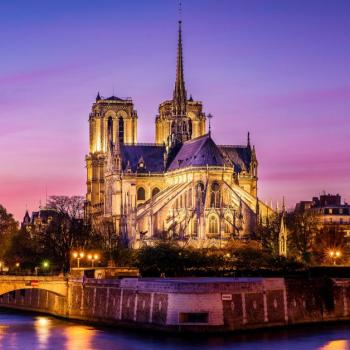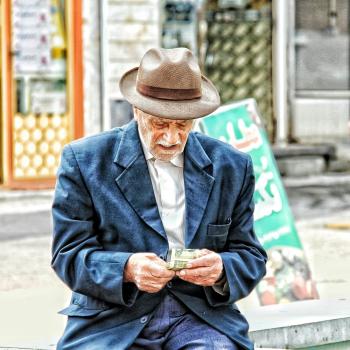So a Catholic poet, an Orthodox priest, and a Southern Baptist therapist walk into a bar…
It sounds like the set-up for a theology joke, but (minus the bar) this is the oddball team God sent to rescue me from the dark wood in which I was trapped a couple of years ago. The amazing experience taught me a lesson in how Christian brothers can work together, across time and traditions, to help each other walk the road to our Father's house.
The poet was Dante Alighieri, author of The Divine Comedy, the medieval masterpiece that is today more admired than read. I'm an avid reader, but vastly prefer non-fiction. I had never cracked the epic poem open, not until I was browsing in a bookstore one summer afternoon and pulled the Commedia, as it is called in the original Italian, off the shelf. The first lines, in Robert and Jean Hollander's translation, go like this:
Midway in the journey of our life
I came to myself in a dark wood,
For the straight path was lost.
I read on, and it struck me: he's talking about a mid-life crisis.
And then: he's talking about me.
I had stumbled into my own dark wood after returning to my hometown following the 2011 death of my sister. What I expected to be a happy homecoming turned instead into an occasion of unceasing anxiety when I discovered that old family fractures could not be healed. I fell into depression and chronic fatigue.
A rheumatologist told me this was caused by family stress, and the only way to escape it was to move away. Not possible, I said. "Then you had better find a way to get inner peace," he replied.
My wife told me that my difficulties were beyond my ability to solve, and that I had to humble myself and start seeing a therapist. This is where Mike Holmes, a professional therapist and a Southern Baptist pastor, came into my life.
Around this time, my Orthodox pastor, Father Matthew Harrington, gave me a demanding prayer discipline, requiring an hour of contemplative prayer daily. Learning how to be still internally in the presence of God was hard for me, but my priest knew that I needed this medicine.
What happened over the next six months was a healing, spiritually and physically. All three Christian men — Dante, Mike, and Father Matthew — worked together to bring me out of the darkness and into the light. It was a case of extraordinary ecumenical teamwork.
The most important of the three was Dante, the 14th-century Catholic literary giant who wrote his Commedia amid his own poverty and exile. The three-part poem — Inferno, Purgatorio, and Paradiso — is an imaginative quest in which a lost soul named Dante recovers his life by journeying through the afterlife, seeking the face of God.
The work is a really a journey into one's own heart, an allegory for the soul's restoration to God through acknowledging its sin, asking for God's mercy, repenting from the ways of sin, and ultimately, being drawn into spiritual unity with God. It sounds highly abstract, but to my great surprise, the Commedia is, for the most part, quite the opposite.
The people Dante meets in Hell, on the holy mountain of Purgatory, and in Heaven are astonishingly real. At one point, entirely absorbed by Dante's incredible story, I realized that I wasn't reading the Divine Comedy; the Divine Comedy was reading me.
In most of my weekly sessions with my therapist, I would begin by talking about what I had read the previous week in Dante, and the reflections it prompted about my own difficult situation. In time, I found that the therapeutic truths Mike was leading me to discover were also in Dante's poem — and encountering them in an adventure story, beautifully told, made them accessible to me in ways that they would not otherwise have been.
Similarly, I would usually begin my confessions to Father Matthew by talking about what reading the Commedia in the previous week or two had revealed to me about my own heart, and the things of which I needed to repent. Strangely enough, this 700-year-old Catholic poem was an amazingly effective guide to examining one's conscience.
In the end, God used Dante's art to reveal my true condition to me, and to show me the way to wholeness. And he used two men from different branches of the Christian tradition — men who had never read Dante — to guide me into applying the lessons of the Commedia to my own life. The result: freedom, healing, and a recovery of the straight path I had lost.
I am convinced that Dante's poem, one of the greatest artistic achievements of Christian civilization, can help contemporary Christians escape their own personal dark wood, no matter what their tradition. In fact, Dante, the medieval Catholic, can serve as a figure of unity for all 21st-century believers. There is something in his work to challenge all of us.




